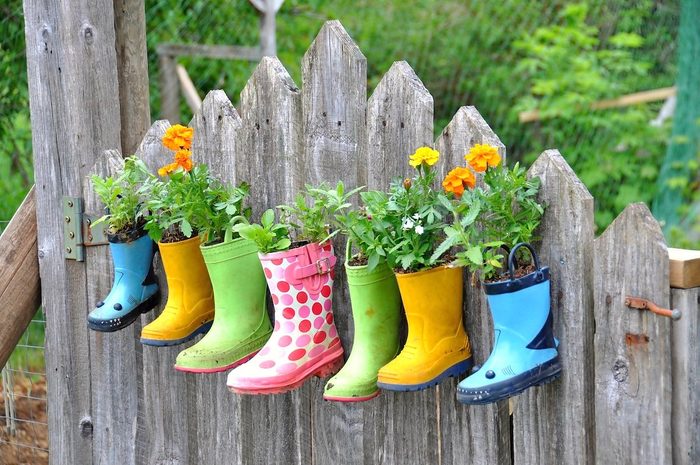Does Dollar General Have Fairy Garden Items
10 Household Items You Should Repurpose in the Garden
 Courtesy Rosina Huber
Courtesy Rosina Huber
Clean out your closets and repurpose your old or extra household items as helpful, thrifty materials in your flower and vegetable gardens.
We've all been there. Ankle-deep in dirt and can't locate, or simply don't have, the item you need (a trowel, fertilizer, container). Necessity is the mother of invention, so you grab whatever's close by in your home or garage and press it into service. It does the trick…and you get a gold star in frugality!
Whether you're a beginner gardener looking for amazing tips or a seasoned pro looking to up your game, I've got you covered. Here are some of the most useful basic garden bargains I've used in my yard that cost next to nothing. You probably have many on hand. They're free for the taking and benefit your garden at the same time!
Found objects
- Garden use: Use worn boots, a damaged watering can, old teapot, or discarded sink as containers for herbs, flowers, and houseplants.
- Why it works: They contribute a touch of whimsy and even a "settled look" to a garden scene.
- How to: If there's no way to drill a drainage hole, just nest a plastic pot within the object.
- Tips: Position found objects near the front of a display or in a high-traffic area so they get noticed. Elevate or anchor an object higher than ground level, for the same reason.
- Other uses: Some found objects can't hold a plant display, but are nonetheless fun or charming as garden decor. Check out how to make a container garden out of next to nothing.
Paper bags
- Garden use: Protect vulnerable plants from frost.
- Why it works: Traps warmer air, insulating plant.
- How to: Set paper bags upside down over tops of vulnerable plants when frost threatens (the growing tip of the plant is most vulnerable). Place soil or rocks over the edge of the bag to hold it in place.
- Tip: Remove bags in the morning so the plant can receive warm sun and any nighttime dampness can evaporate.
- Other uses: Use to start seeds or seedlings that will be later moved into your garden (bag and all, as it will rot in place); place over ripening fruit to protect from pests (cinch with string, rubber band, or even staples). On that note, these are the easiest foods to grow at home during quarantine.
Kitchen utensils
- Garden use: They're practical for cultivating and repotting—durable and effective.
- Why it works: Kitchen utensils are tough and sharp enough to do the job without causing damage.
- How to: Forks: Create rows in flats (use like a wee rake), lift seedlings, tease apart dense rootballs. Knives: Separate flats, eject root-bound plants from their pots (run a knife around the interior to dislodge), divide smaller perennials. Spoons: Lift small seedlings from a flat when transplanting.
- Tip: If a utensil isn't sharp enough, don't force the issue; just switch to a different implement.
Newspapers
- Garden use: Snuff out grass and prevent weed germination for new garden beds.
- Why it works: Newspaper keeps light and unwanted intruders out of the soil.
- How to: Thicker layers are most effective for snuffing out grass…up to 30 sheets will do.
- Tips: Dampen the newspaper after it's in place, and anchor the corners with rocks so the pile won't shift or blow away. Lay several inches of mulch (compost, straw, shredded leaves or bark chips) on top for extra insurance—and because it looks better.
- Other uses: Shred, dampen, and add to your compost pile; set a dry, clumped ball of newspaper into the garden to trap pesky earwigs. Check out these tips to get rid of garden pests.
Tin cans
- Garden use: Tin cans make good collars to thwart destructive cutworms.
- Why it works: It's a physical barrier they cannot cross.
- How to: Remove the top and bottom of can, press into soil, then plant seed(s) or seedling(s) within.
- Tip: As extra insurance, you can also sprinkle cornmeal just outside the can…cutworms will eat it but cannot digest it.
- Other uses: Use to check your sprinkler watering (remove only the tops, then set several at intervals on your lawn, turning off the water when the water level reaches 1 inch). Or use to raise up a ripening watermelon or squash so that part of the fruit won't rot on moist ground.
Coffee grounds
- Garden use: Sprinkle on the ground at the base of certain plants.
- Why it works: Adding the organic matter to the soil helps improve drainage in clay and water-holding capacity in sandy soils.
- How to: Apply a small amount over a plant's root zone.
- Tip: Use on any plant, especially those that like rich, moist organic soils, like azaleas and blueberries.
- Other uses: Sprinkle coffee grounds where you've planted carrot seeds to discourage carrot rust flies. Also place them at base of plants to make a scratchy barrier that slugs and snails are reluctant to cross.
- Also, remember to never kill these bugs when you find them in your garden.
Bar soap
- Garden use: May keep deer from feasting on your trees and plants.
- Why it works: It's thought that the strong scent of deodorant in bar soaps may deter deer and other backyard pests.
- How to: Break a bar of soap into several pieces and hang them from strings or in old nylons or net bags on your tree.
- Tip: Hang bars of soap on posts or other structures near-prime feeding areas if deer are attacking garden plants.
- Other uses: If deer are devouring your tulips, slice or grate up soap and sprinkle the shavings around the plants.
Disposable aluminum pie tins
- Garden use: These can scare pests away, at least temporarily.
- Why it works: Tins make an annoying noise as they bang around in the breeze. They also flash reflected light, which may be disconcerting.
- How to: Tie pie tins to a string and hang from branches, a trellis, or your garden fence.
- Tips: Use several; use at different heights; move around to keep the pests guessing.
- Other uses: Fill pie tins with beer and set in slug- or snail-infested areas to trap them; cut to make a collar to set at the base of vulnerable vegetable seedlings, thus thwarting soil-borne insect pests (a pie tin also reflects heat upward onto a plant, a nice plus).
Packing peanuts
- Garden use: Improves drainage in pots.
- Why it works: Permits water, but not soil, to pass through.
- How to: Layer out of sight in bottom of a pot, then add soil mix sufficient to support the root systems.
- Tips: This is a great way to reduce soil-mix use in large pots. Also, it makes the pots weigh less, so they're easier to pick up or move around.
- Other uses: Layer in the bottom of any container that lacks a drainage hole. While these tool tips are helpful, make sure you stock up on these must-have garden tools for next season.
Old hosiery
- Garden use: Tie up floppy plants; anchor vines.
- Why it works: Hoisery is soft, flexible and won't damage plants, even as they grow.
- How to: Cut or tear into slender lengths. Use a figure-eight knot (one loop around support, one around stem or branch).
- Tip: To hide it from view, tie out of sight, behind foliage.
- Other uses: Line bottoms of pots with hoisery so water can get out but dirt can't. This will also keep small bugs from getting in. In addition, try slipping hoisery over ripening fruit to protect from nibbling pests or use as a sling to support heavy fruits, such as melons. While you're thinking broadly, try these inexpensive plants to make the garden pop.
Originally Published: August 24, 2020
![]()
Sign up for articles sent right to your inbox
Enjoy the best stories, advice & jokes delivered right to your inbox!

Subscribe & SAVE Save Up To 84%!
Does Dollar General Have Fairy Garden Items
Source: https://www.rd.com/article/10-household-items-you-should-repurpose-in-the-garden/
Posted by: johnsonsniters.blogspot.com

0 Response to "Does Dollar General Have Fairy Garden Items"
Post a Comment